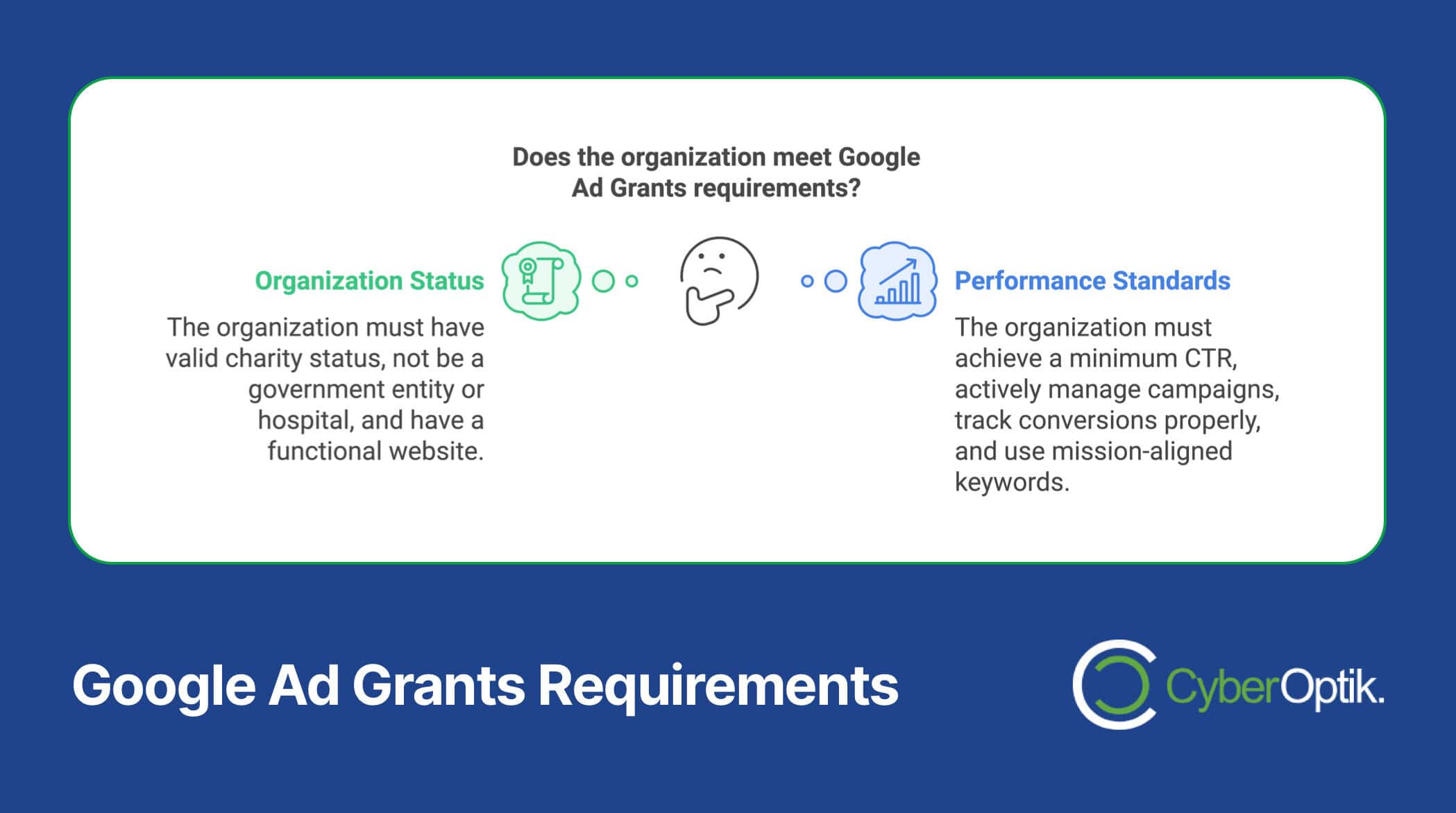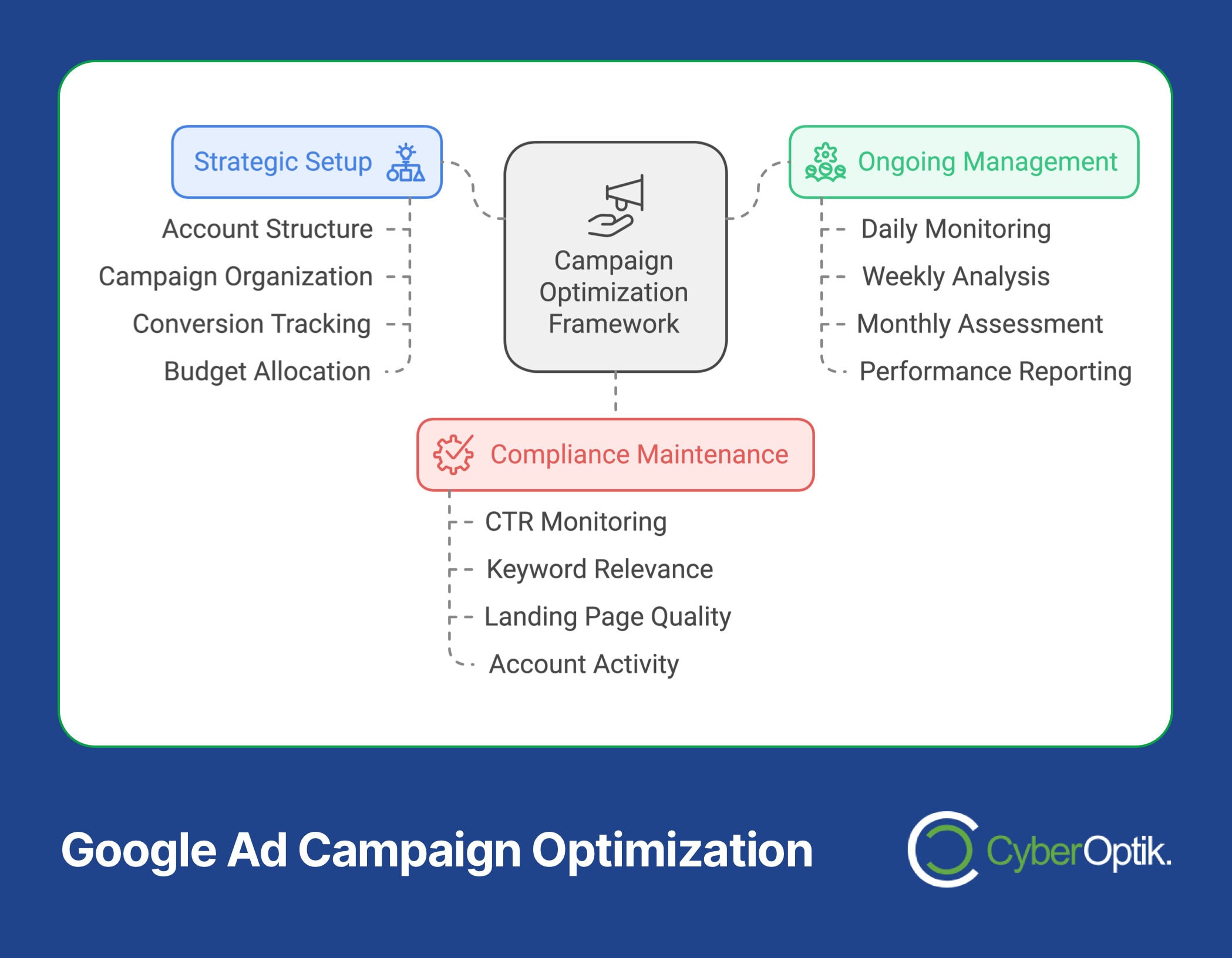While most nonprofits struggle with limited marketing budgets, there’s a powerful solution that many overlook: professional Google Ads management through the Ad Grants program. This program offers eligible nonprofits up to $10,000 in monthly advertising credits, but success requires more than just access to funds—it demands strategic expertise and consistent management.
Search ads deliver exceptional value for nonprofits, generating an average return of $4.78 for every dollar spent (Source).
- Understanding Google Ad Grants
- The ROI Potential of Google Ads for Nonprofits
- Key Components of Successful Nonprofit Campaigns
- Professional Management Strategies
- Monitoring and Optimization Techniques
- Common Challenges and Solutions
- Getting Started with Google Ad Grants
With Google controlling over 93% of the global search engine market (Source), professional Google Ads management isn’t just an option—it’s a crucial strategy for nonprofits seeking to maximize their reach and impact.
Whether you’re looking to increase donations, recruit volunteers, or raise awareness for your cause, proper management of Google Ad Grants can transform your digital marketing efforts. As a digital marketing agency specializing in PPC advertising and campaign optimization, we understand the unique challenges nonprofits face in digital advertising.
This comprehensive guide will walk you through everything you need to know about leveraging professional Google Ads management to elevate your nonprofit’s campaigns.
Understanding Google Ad Grants
The Google Ad Grants program represents a game-changing opportunity for nonprofits, providing up to $10,000 in monthly advertising credits to eligible organizations. However, understanding the program’s requirements and maintaining compliance is crucial for long-term success.

Eligibility Requirements
To qualify for Google Ad Grants, organizations must:
- Hold valid charity status in their country
- Acknowledge and agree to Google’s required certifications
- Have a functional website with substantial content
- Not be a governmental entity, hospital, or medical group
Program Compliance Guidelines
Maintaining access to Google Ad Grants requires adherence to specific performance standards:
- Maintain a minimum 5% click-through rate (CTR)
- Implement proper conversion tracking
- Use relevant keywords aligned with your mission
- Maintain active account management
- Link to high-quality landing pages
Professional Management Benefits
Working with a professional agency like CyberOptik can help ensure optimal bidding strategies and maintain compliance through:
- Regular account monitoring and optimization
- Strategic keyword research and implementation
- Professional ad copy creation
- Conversion tracking setup and maintenance
- Performance reporting and analysis
Application Process Overview
The path to securing Google Ad Grants involves several key steps:
- Register with TechSoup to verify nonprofit status
- Create a Google for Nonprofits account
- Submit the Ad Grants application
- Set up your Google Ads account
- Configure initial campaigns
Professional management becomes particularly valuable during the setup phase, ensuring your account is structured correctly from the start and maximizing your chances of approval.
The ROI Potential of Google Ads for Nonprofits
Professional management of Google Ads can dramatically impact a nonprofit’s digital marketing success. Understanding the potential return on investment helps organizations make informed decisions about allocating resources to campaign management.
Measuring Success Through Key Metrics
When professionally managed, Google Ad campaigns can track and optimize various success indicators:
| Metric | Impact on ROI |
|---|---|
| Conversion Rate | Measures successful donor/volunteer actions |
| Click-Through Rate | Indicates ad relevance and appeal |
| Cost per Conversion | Shows efficiency of spending |
| Impression Share | Reveals market visibility |
Maximizing Impact Through Professional Management
Professional management significantly enhances campaign performance through:
- Strategic keyword selection and optimization
- Advanced audience targeting techniques
- Continuous performance monitoring
- Data-driven decision making
Leveraging Market Reach
With Google’s dominant 93% share of the search engine market, professionally managed campaigns can:
- Increase visibility across relevant search queries
- Target specific geographic areas effectively
- Reach donors and volunteers at crucial decision moments
- Scale campaigns based on performance data
Cost-Effectiveness Analysis
Professional management helps organizations maximize their Ad Grant budget by:
- Optimizing bid strategies for maximum impact
- Focusing spending on high-performing keywords
- Eliminating waste in ad spend
- Improving quality scores to enhance ad positioning
Learn more about optimizing your advertising budget through our comprehensive guide on display ads versus search ads performance.
Professional management ensures nonprofits can effectively utilize their full $10,000 monthly grant while maintaining compliance with Google’s requirements.
Key Components of Successful Nonprofit Campaigns
Professional Google Ads management ensures your nonprofit’s campaigns are built on a foundation of proven strategies and best practices. Let’s explore the critical components that drive campaign success.

Strategic Keyword Selection
Professional management elevates your keyword strategy through:
- Mission-aligned keyword research
- Long-tail keyword optimization
- Negative keyword implementation
- Competition analysis
Best Practice Tip: Avoid single-word keywords unless they’re specifically related to your brand, as they often lead to lower quality scores and reduced performance.
Compelling Ad Copy Creation
Expert ad copy development focuses on:
- Clear calls-to-action
- Mission-focused messaging
- Emotional connection building
- Impact demonstration
- Character limit optimization
Learn more about creating effective ad copy through our detailed guide on Google Ads copy templates.
Landing Page Optimization
Effective landing page optimization is key to the success of any nonprofit’s digital campaigns. Professional management ensures that landing pages are perfectly aligned with ad messaging to maintain consistency and relevance. They are optimized for conversions to encourage desired actions, mobile-responsive to cater to users on all devices, and fast-loading to minimize drop-offs due to slow performance. Additionally, trust-building elements are incorporated to enhance credibility and encourage user engagement.
Audience Targeting Refinement
Strategic audience targeting is essential for reaching the right people with your message. Professional managers refine targeting strategies by optimizing geographic reach, tailoring demographics, and leveraging interest-based targeting to engage specific user groups. Remarketing is also implemented to re-engage previous visitors and maximize campaign efficiency, ensuring no opportunity is wasted.
Campaign Structure Organization
Organized campaign structures are vital for achieving clarity and efficiency. Professional managers implement logical ad group segregation to streamline campaign management, organize campaigns around specific themes for focus, and establish clear naming conventions for better tracking and analysis. Budgets are allocated efficiently, ensuring resources are directed to the most impactful areas. This cohesive structure allows each component to work harmoniously, maximizing your nonprofit’s reach and impact while adhering to Ad Grant compliance requirements.
Quality Score Optimization
Maintaining high-quality scores is a cornerstone of effective campaign management. Expert managers ensure keyword relevance by aligning ads with targeted searches, optimize landing page experiences to provide value and usability, and work to improve click-through rates through compelling ad copy and creative strategies. Continuous monitoring of ad relevance ensures campaigns stay aligned with audience needs, driving better performance and lower costs.
Visit our guide on value-based bidding strategies to learn more about maximizing campaign performance.
Professional Management Strategies
Effective Google Ads management for nonprofits requires a comprehensive approach that balances compliance requirements with performance optimization. Here’s how professional management delivers results while maintaining program eligibility.
Strategic Account Setup
Professional managers implement a structured approach to account setup:
- Account structure development
- Campaign organization by objective
- Ad group categorization
- Conversion tracking implementation
- Campaign configuration
- Budget allocation planning
- Bidding strategy selection
- Geographic targeting setup
- Quality assurance
- Compliance check implementation
- Performance monitoring setup
- Reporting framework creation
Compliance Management
Key compliance areas that professional management addresses:
- Maintaining minimum 5% click-through rates
- Ensuring keyword quality and relevance
- Monitoring account activity levels
- Maintaining accurate conversion tracking
- Ensuring landing page quality
Learn more about maintaining high performance through our guide on Google Ads A/B testing strategies.
Budget Optimization Techniques
Professional managers employ sophisticated budget optimization strategies:
- Daily budget distribution across campaigns
- Bid adjustments based on performance data
- Resource allocation to high-performing ad groups
- ROI-focused spending decisions
Performance Enhancement Strategies
Ongoing optimization includes:
- Regular performance audits
- A/B testing of ad copy and landing pages
- Keyword refinement and expansion
- Quality score improvement initiatives
- Competitor analysis and adaptation
Professional management ensures your nonprofit maximizes the value of every dollar from your Google Ad Grant while maintaining strict compliance with program requirements.
Reporting and Analysis
Professional managers provide:
- Regular performance reports
- ROI analysis
- Trend identification
- Strategic recommendations
- Compliance status updates
Check out our insights on comparing different ad formats for maximum impact.
Monitoring and Optimization Techniques
Successful Google Ads management for nonprofits requires continuous monitoring and strategic optimization. Professional management ensures your campaigns maintain peak performance while meeting all program requirements.
Essential Performance Metrics
| Metric Category | Key Indicators | Impact on Success |
|---|---|---|
| Engagement Metrics | Click-through rate, Time on site, Bounce rate | Indicates ad and content relevance |
| Conversion Metrics | Donation rate, Sign-up completion, Volunteer registration | Measures goal achievement |
| Cost Metrics | Cost per conversion, Budget utilization, ROI | Determines resource efficiency |
| Quality Metrics | Quality score, Landing page experience, Ad relevance | Affects ad placement and cost |
Professional Monitoring Schedule
Expert managers implement a structured monitoring approach:
- Daily Checks:
- Budget pacing review
- Critical metric monitoring
- Error detection
- Weekly Analysis:
- Performance trend evaluation
- Keyword performance review
- Bid strategy adjustment
- Monthly Assessment:
- Comprehensive performance review
- Strategy refinement
- Compliance audit
Optimization Techniques
Professional managers employ advanced optimization strategies: 1. Keyword Optimization
- Search term analysis
- Negative keyword refinement
- Bid adjustment based on performance
- Quality score improvement
- Ad Copy Enhancement
- A/B testing implementation
- Message refinement
- Call-to-action optimization
- Extension updates
Learn more about testing strategies in our guide to data-driven success with A/B testing.
Advanced Analytics Implementation
Professional management includes:
- Custom dashboard creation
- Automated alert setup
- Cross-channel tracking
- Attribution modeling
Professional monitoring and optimization ensure your nonprofit’s Google Ads campaigns consistently improve while maintaining compliance with program requirements.
Performance Reporting
Comprehensive reporting includes:
- Key metric tracking
- Goal progress measurement
- ROI analysis
- Strategic recommendations
- Compliance status updates
Explore our insights on value-based bidding strategies for enhanced campaign performance.
Common Challenges and Solutions
While Google Ad Grants offer tremendous opportunities, nonprofits often face specific challenges in managing their campaigns. Professional management helps overcome these obstacles and maintain optimal performance.
Challenge 1: Maintaining Click-Through Rates
Common Issues:
- Struggling to meet the 5% minimum CTR requirement
- Inconsistent ad performance
- Poor keyword relevance
Professional Solutions:
- Strategic keyword refinement
- Ad copy optimization
- Regular performance monitoring
- Quality score improvement tactics
Challenge 2: Budget Utilization
Common Issues:
- Difficulty spending full grant amount
- Inefficient budget allocation
- Limited keyword opportunities
Professional Solutions:
- Strategic campaign expansion
- Advanced bidding strategies
- Keyword discovery and implementation
- Geographic targeting optimization
Learn more about effective budget management in our guide to optimizing ad performance.
Challenge 3: Technical Compliance
Common Issues:
- Missing conversion tracking
- Incorrect account setup
- Policy violations
Professional Solutions:
- Expert account configuration
- Regular compliance audits
- Proper tracking implementation
- Ongoing monitoring and adjustment
Challenge 4: Landing Page Performance
Common Issues:
- Poor conversion rates
- High bounce rates
- Slow loading times
Professional Solutions:
- Landing page optimization
- A/B testing implementation
- User experience improvement
- Mobile responsiveness enhancement
Professional management transforms common challenges into opportunities for optimization and growth, ensuring your nonprofit maintains program compliance while maximizing results.
Prevention Strategies
Professional managers implement proactive measures:
- Regular account audits
- Performance monitoring systems
- Automated alert setup
- Strategic planning and forecasting
- Continuous optimization protocols
Discover more about maintaining high performance through our Google Ads optimization guide.
Getting Started with Google Ad Grants
Successfully launching and maintaining a Google Ad Grants account requires careful planning and expertise. Here’s how professional management can help you navigate the process effectively.
Initial Implementation Steps
- Preparation Phase
- Nonprofit status verification
- Website compliance check
- Goal setting and strategy development
- Resource allocation planning
- Account Setup
- Google for Nonprofits registration
- Ad Grants application submission
- Account structure development
- Tracking implementation
- Campaign Development
- Keyword research and selection
- Ad copy creation
- Landing page optimization
- Budget allocation
Professional Management Benefits
Working with experienced managers provides:
- Expedited setup and approval process
- Expert compliance management
- Strategic campaign development
- Ongoing optimization and support
- Regular performance reporting
Learn more about optimization strategies in our guide to value-based bidding.
Timeline Expectations
| Phase | Timeline | Key Activities |
|---|---|---|
| Initial Setup | 1-2 weeks | Account creation, verification, application |
| Campaign Development | 1-2 weeks | Strategy creation, campaign building |
| Optimization Period | 1-3 months | Performance refinement, data collection |
| Sustained Growth | Ongoing | Continuous improvement, expansion |
Conclusion
Professional Google Ads management transforms the potential of Ad Grants into tangible results for nonprofits. With expert guidance, organizations can:
- Maximize their $10,000 monthly grant
- Maintain consistent program compliance
- Achieve meaningful campaign objectives
- Scale their digital marketing impact
Ready to Maximize Your Google Ad Grant?
Contact CyberOptik to learn how our professional management services can help your nonprofit achieve its digital marketing goals while maintaining full compliance with Google’s requirements.




